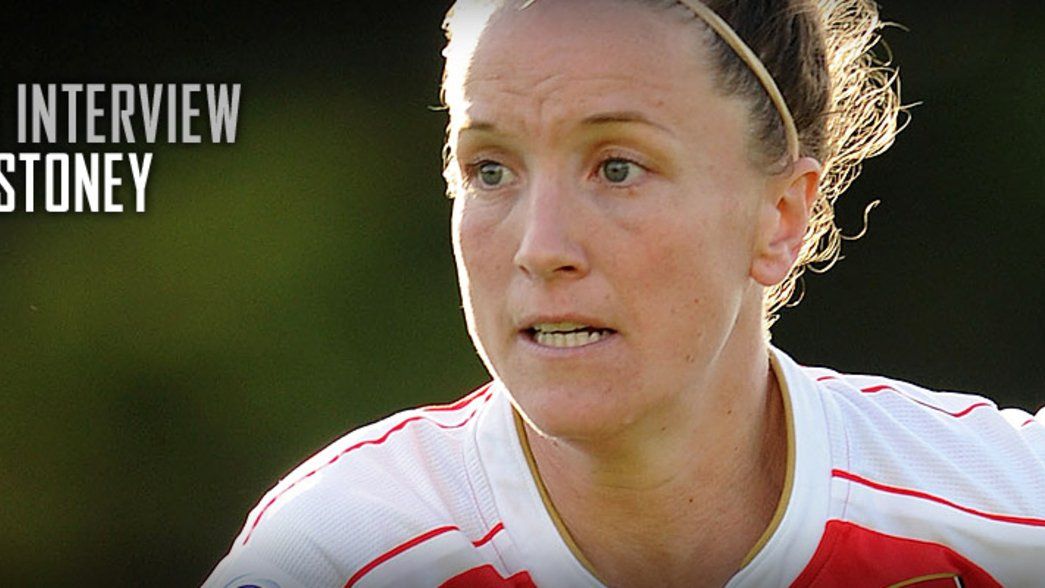This story first appeared in the April 2016 edition of the Arsenal Magazine.
SUBSCRIBE TO THE ARSENAL MAGAZINE

Mesut Ozil adorns the front cover of April's Arsenal Magazine
Casey Stoney, MBE, has played in top-flight women’s football for 17 years with periods at Charlton, Chelsea, Lincoln and Arsenal. The defender was also part of the Great Britain Olympic Team in 2012 and has made 118 appearances to date for England – including the 2015 FIFA Women’s World Cup as part of the first English team to reach the semi finals.
Here she provides us with a fascinating insight into her matchday routine. I believe one of the biggest differences between the best players and the rest is the mental edge.
Casey Stoney
When I was younger I was lacking self-confidence and was my own worst enemy when it came to self-appraisal; focusing a lot more on the negatives rather than the positives in performance. By explicitly working on mental preparation over the years, I've developed mental skills that have helped me consistently get the best out of myself.
In 2005, an excellent sport psychologist came into the England set-up and introduced us to a range of strategies that I have been drawing upon ever since. She really helped me figure out what worked for me, and I found visualisation to be really effective.
I usually begin my visualisation process late in the week during the season. On a Friday evening, after we've had the matchday line-up, I begin rehearsing what I will do during the match. Using the replay analysis software, I watch video clips of the opposition, particularly centre forwards.
Looking at their strengths, weaknesses, trends in their movement and play, and imagine how I will react in different scenarios. On the matchday, as soon as I arrive at the ground, I put my gear in the dressing room and straight away go out on the pitch with my iPod on. I like happy music that puts me in a positive frame of mind, rather than high-tempo which tends to put me in a state of over-arousal.
I scan the pitch and mentally rehearse different scenarios that are likely to occur during the game. Starting at the six-yard line, and from a first person perspective, I see myself defending crosses and clearances. Then I move towards the 18-yard box and visualise defending in and around the box.
Thinking about playing out from the goalkeeper and the different types of passes I will play. I continue to the halfway line and visualise different defensive situations. When I've completed this process, I go to the opposite side of the pitch and repeat the routine as we might play the first half from either end of the pitch.
When I return to the dressing room, after getting ready and kitted up, I check the set-plays and rehearse them in my mind, also checking my team-mates' roles so that I know what is going on around me. I always check with the manager about any additional information he wants to give me and check the team sheets to find out exactly how the opposition will line up and who I will be up against.
"I draw confidence from ticking all the boxes in preparation for performance. For me, the mental preparation side is as important as the physical, technical and tactical aspects"
Casey Stoney
Just before kick-off, I get myself in a calm state of readiness and focus. Players have different routines before games, some like to throw a baseball around or dance, while I like to focus inwards, without distractions.
As team captain over the years I would have other responsibilities on matchday and need to check in with other players. But just before kick-off I clear my mind and focus solely on my performance, which ultimately is my biggest contribution on the day.
On the pitch during the team line-up, particularly in a high-pressure game where nerves might come in to play a bit more, I use breathing techniques to help me stay relaxed and stop my mind from racing.
I focus on a fixed point in the stands, breathing in for three seconds and out for four. Some people perceive pre-match nerves as a negative response to pressure, but I always see nerves as a sign that I have the fire in my belly and am ready to perform.
During the game, how I recover from inevitable mistakes is crucial.
I re-focus immediately on the next task at hand, whether it is communicating with a team-mate, or getting on the opposition’s centre forward. It's important to park it straight and focus on the next immediate action. That’s what you can control, you can’t do anything about what just happened.
I draw confidence from ticking all the boxes in preparation for performance. For me, the mental preparation side is as important as the physical, technical and tactical aspects. It’s another box that needs to be ticked.
I didn’t miss a training session, I am physically fit, I studied the opposition, I have completed my visualisation routine. This removes all doubts and when the going gets tough my mental resolve remains steadfast, paving the way for success.

Casey Stoney
Copyright 2024 The Arsenal Football Club Limited. Permission to use quotations from this article is granted subject to appropriate credit being given to www.arsenal.com as the source.










